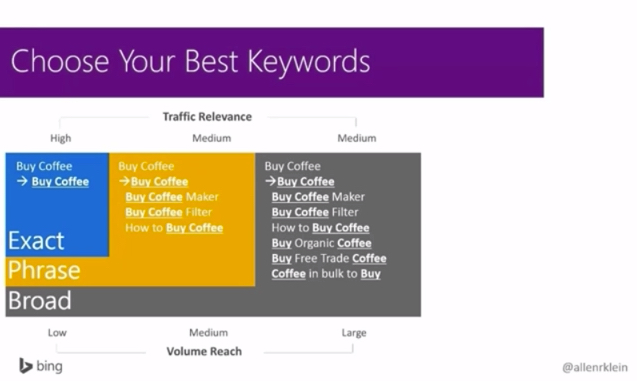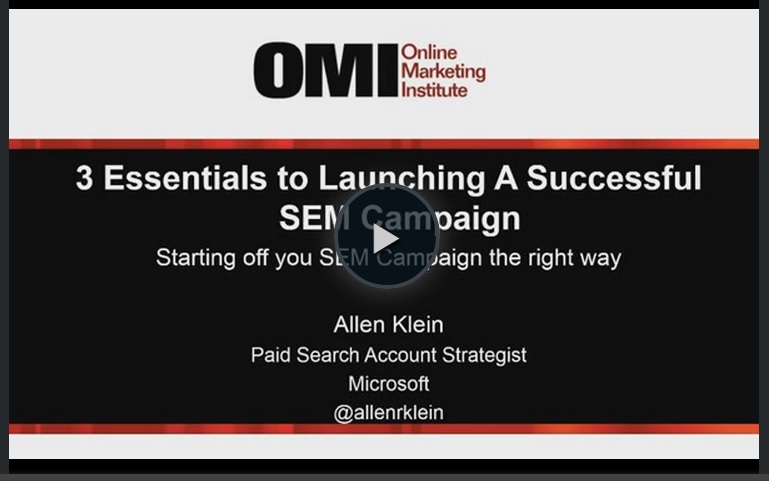Paid search campaigns are a critical element in a good digital marketing strategy, but not something that I have had to deal with much in my marketing roles. Basically I’ve done a lot of SEO, and not a lot of SEM! But I’ve been getting up to speed in recent weeks with OMI’s Search Engine Marketing classes, which encompass a great mix of topics like PPC, AdWords and local search.

I started at the beginning with a class called “Fundamentals of a Paid Search Campaign,” led by Microsoft’s Paid Search Account Strategist Allen Klein.
With Basic, Intermediate and Advanced classes under OMI’s Search Engine Marketing umbrella, even a search marketing newbie like me can move quickly to the top levels. Here’s a crash course on paid search for other newbies – it’s a great jumping-off point if you’re thinking of adding paid search to your strategy (and you probably should be).
Fundamentals of a Paid Search Campaign
This class starts off with a clear message about how to create a successful campaign – the story of why Amazon founder and CEO Jeff Bezos decided to start selling books and CDs online. Although no one else was really doing so at the time, Bezos saw that selling books would provide a large inventory that could be accessed easily. The other key factor was cost – he knew that the postal service’s Media Mail option represented a very cheap way to ship these items, and at a flat rate since it isn’t weight-dependent.
Maximize Efficiency
Why is this relevant to paid search? Because Bezos was able to dominate the market by creating a high level of efficiency for his specific niche. Easy inventory, cheap shipping and little competition essentially combined to create a super-efficient niche that allowed Amazon to establish itself. And once he did that…well, we all know how it went for him (net worth 34 billion in case you’re wondering).
The takeaways should be clear if you’re paying attention: Find that niche or fill a gap that maximizes efficiency, and establish yourself there.
In terms of paid search, this really means honing in on those keywords that work well for you, those ones you can always go back to for good results. They play to your strengths, but are unique enough not to play to everyone else’s strengths too. The reason for this is pretty simple – you need to get high Click Through Rates (CTR) to establish your paid search campaign and achieve a good position in the paid search auction.
AdRank = CTR x Your Max Bid
Okay, in reality it is a little more complicated than that – but your main focus should be on getting good CTRs so that your ads can be seen. Google describes AdRank as “calculated using your bid amount, the components of Quality Score (expected click through rate, ad relevance, and landing page experience), and the expected impact of extensions and other ad formats.” As always with SERPs, high quality content and landing pages are rewarded, but you can optimize in various ways to move yourself up the list.
Related Class: PPC and SEO: A Perfect Pair
CTR is really a measure of your relevance to the person searching; if your ad is highly relevant to the paid search term you’ve bid on, you’re likely to get a click. If you choose keywords based on factors other than relevancy, or write ads that don’t fit well with your paid keyword, you’re unlikely to tempt searchers. Once you’ve established a good CTR on your ad, more searchers will see your ad as your AdRank improves.
Reach and Relevance
When bidding on your chosen keywords for a new paid search campaign, you’ll need to choose whether you want exact, phrase or broad match searches to see your ad:

As this slide shows, exact match bidding will limit your reach considerably, but you’ll also have much more relevancy (read: higher CTR) to those searchers. Phrase and broad matches will help you reach more people, but will lower your CTR as you’re not going to be 100% relevant to those you reach. So what’s a paid search campaigner to do?
Allen Klein suggests waterfall bidding – place your highest bid on exact match, your second bid on phrase match, and third bid on broad match. This class really emphasizes being efficient in your choices, and exact match is the most efficient option. It’s also the best way to establish your ad when it’s new so you can move up the AdRank, making it a great place to start out with new paid search terms.
Ad Location, Optimization, and Best Practices
Where your ads will appear in search results will also have a big effect on CTRs and efficiency, but your budget may be the deciding factor there since ads are priced based on location on the SERP. I’m running out of space to address this fully here, so I’ll refer you to the expert:
